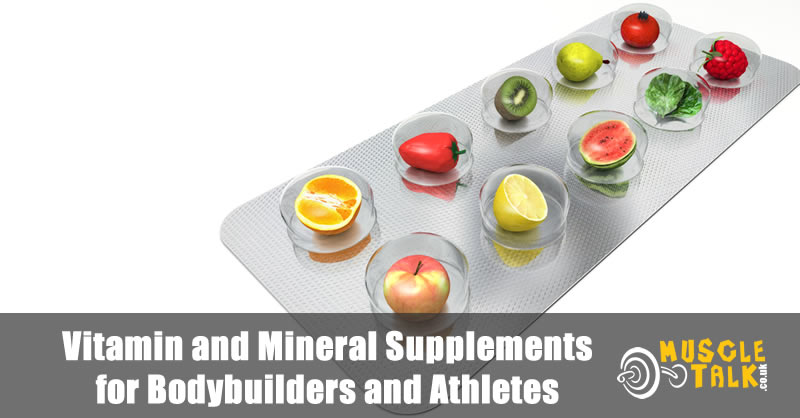Vitamins and minerals are collectively known as micronutrients and are essential nutrients found in our food. They are required for life and good health and broadly speaking, our bodies do not synthesise them and so we have to obtain them from what we eat.
Their role in the body is to regulate metabolism and assist in numerous physiological and biochemical functions. Insufficient intakes may lead to deficiency problems, and in extreme cases, even death.

The issue of whether vitamin or mineral supplements are required for optimal health or maximum sports performance is a topic which is always a contention of debate.
If you are eating a healthy balanced and varied diet in sufficient amounts, then evidence indicates in most cases, you’ll be okay and there is no need for a supplement formula. However, some alternative practitioners and nutritional therapists (as well as supplement manufacturers, of course!) will claim that you do need supplements of vitamins and minerals for ‘optimum’ health or to ‘just to make sure that you’re getting enough’.
Scientific research into this debate has spanned several decades, with the aim of concluding whether supplementation over and above normal nutrition is required in order to reduce risk of disease and/or to maximise performance.
In some cases the research is conclusive and supplements are recommended, e.g. folic acid in the initial stages of pregnancy to reduce the risk of spina bifida in the child; or vitamin C in smokers, as smoking reduces blood levels of vitamin C significantly. Generally, it is certain sectors of the population that do have a use for supplements.
Mega Dosing
Sports enthusiasts and bodybuilders are traditionalists for mega-dosing, without any real reason for doing so. The mindset of bodybuilders seems to revolve around the concept of more-is-better, and this is true in training, eating and supplementation. Though this is a mindset which we’d do well to be rid of.
Certain vitamins can have harmful side effects if taken in too large quantities. Vitamin C is fashionably mega-dosed on, but are you aware that too much for too long a period can lead to calcium oxalate kidney stones? As vitamin C is water soluble, people have the misconception that you cannot take too much, which is wrong!
There are many other examples; a few include: There have been cases of death from too much vitamin A; rare, but there are reports of hair loss, liver and bone damage. Excess thiamin (vitamin B1) can cause headaches and irritability.
Over intakes of vitamin D can cause too high blood calcium levels, potentially causing muscle spasms. Too much sodium raises blood pressure; not unfamiliar as we hear this from the health message urging us to reduce our intake of salt.
Mega-doses of iron can be lethal, especially in children, as iron levels are only controlled by what you eat, absorbed and what comes out when you bleed. Zinc in high amounts can cause nausea and vomiting. There are many cases of excess iodine intake causing goitre (an enlarged thyroid gland, making the neck swell up) and hyperthyroidism, i.e. a racing metabolism, which will hold you back in muscle gains.
Too much fluoride can cause tooth and nail crumbling. I could go on…
Many vitamins and minerals are supplemented in high doses for their antioxidant effects. Vitamins C and E, beta-carotene and selenium are all antioxidants which have been shown to reduce incidence of cardiovascular disease and some cancers.
Antioxidants help stop the oxidation process, which is part of the process of certain diseases, so this is an apparent benefit leading people to believe that consuming more of these antioxidants will reduce risk of disease progression. But, studies have shown that there are optimal intake levels, and these levels are well below what many people supplement with.
The American Food and Drug Administration (FDA) have researched this in detail and have concluded that the consumption of food in its natural form is ideal. In nature chemicals are naturally in a biochemical redox system, which is where some nutrients and anutrients (anutrients are non-nutrient constituents of food which have beneficial effects, but are not necessary for life) act as antioxidants and others act as pro-oxidants, so they balance each other out.
If there are too high levels of antioxidants in the blood from consuming supplements, they may actually become pro-oxidant in certain circumstances, thereby increasing oxidation and risk of disease. Therefore consuming too high intakes of antioxidant supplements may have detrimental effects on health.
So what should athletes and bodybuilders do?
In the UK we’re encouraged to have at least five servings of fruit and vegetables per day. This is essential for us to get sufficient intakes of many micronutrients. However, this is the bare minimum, and I’d like to think that as you’re reading this article you’re more health conscious than the average Britton, so aim for 7-8 servings of fruit and veg per day.
I know that sounds a lot, but for more information of what constitutes a portion and how to consume 7-8 per day read the article Fruit & Veg in Health & Fitness.
For these reasons orthodox nutritionists and dietitians recommend consuming a healthy balanced diet including foods from each of the food groups, with plenty of fruit and vegetables everyday.
If you’re a hard training athlete or bodybuilder then you should be eating more food, so the fact that you’re eating more will mean that you’re consuming higher levels of micronutrients by default. In certain circumstances, there may be a case for supplements. But in general a plentiful healthy diet should cover all.
So if you feel you need more vitamins and minerals, check your diet first and eat a good variety of foods including more fruit and vegetables before purchasing a pot of pills.
